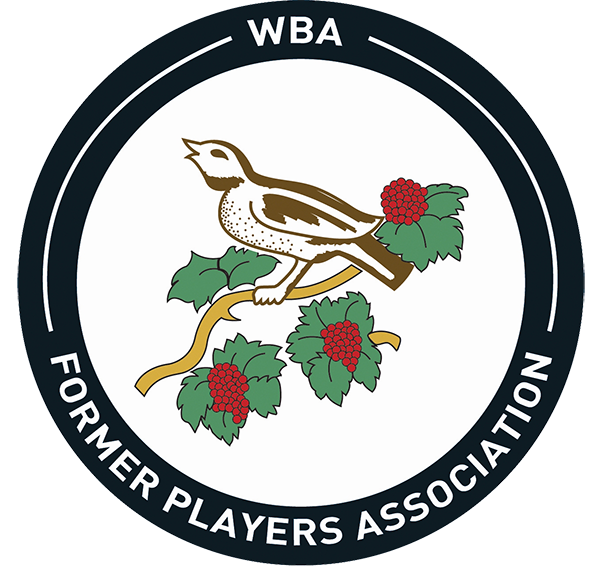FAREWELL BILLY
History is full of sad stories, in life as well as football, and of course we lose great people along the way all the time, that is life and death in an essence. However, as the Albion team and fans were preparing for yet another F.A Cup Semi-Final, this time at Highbury against the much fancied Preston North End team, on Thursday 7th April 1937, just three days before the big game at Highbury, the Borough of West Bromwich and all within it were ‘rocked to the core’ by the sudden and untimely death of club chairman William Isaiah Bassett, better known as ‘Billy’ of course who passed away at his home in West Bromwich aged just 68 years, throwing the club into a state of deep shock and sadness, which included of course the players, most of whom would have known the great man very well, many looking at him as a father figure in many ways. It was no secret at the football club that Mr Bassett’s door was always open, and he was without doubt a wise and trusted mentor to them all and there is no doubt they would have been deeply affected.
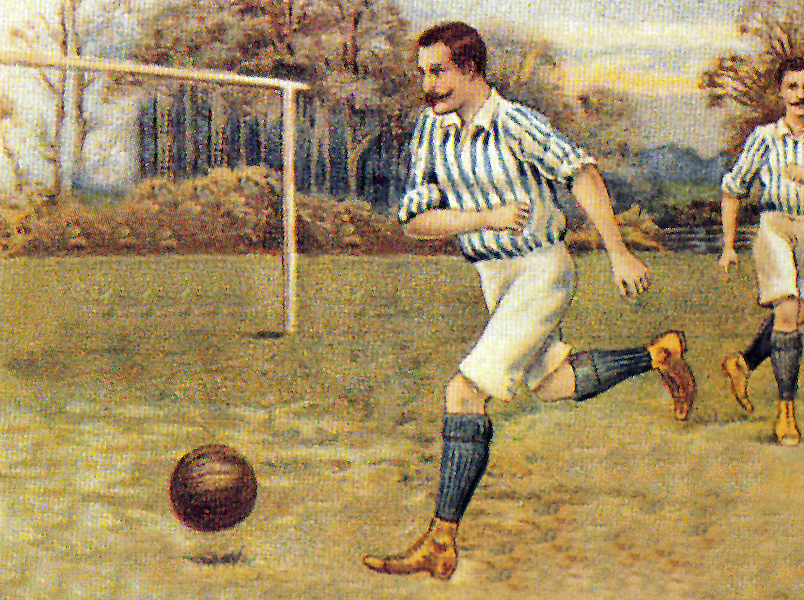
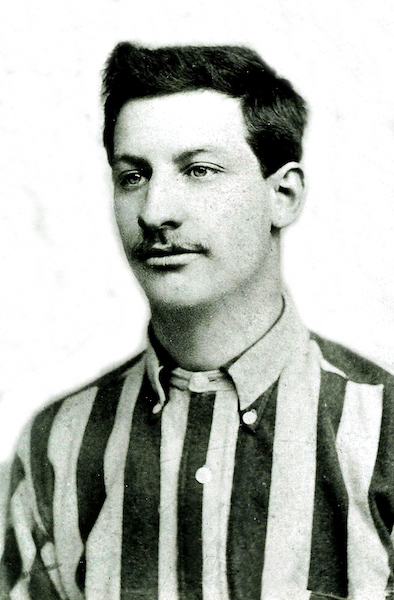
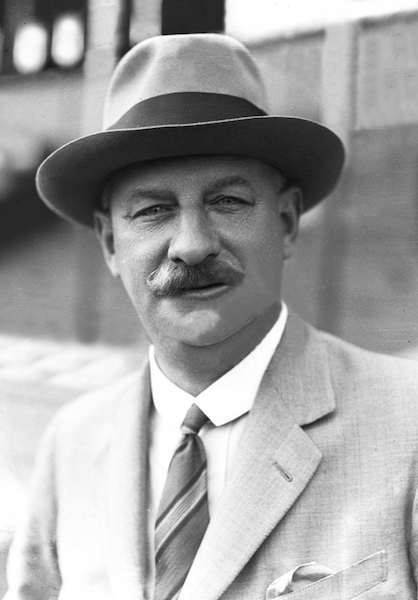
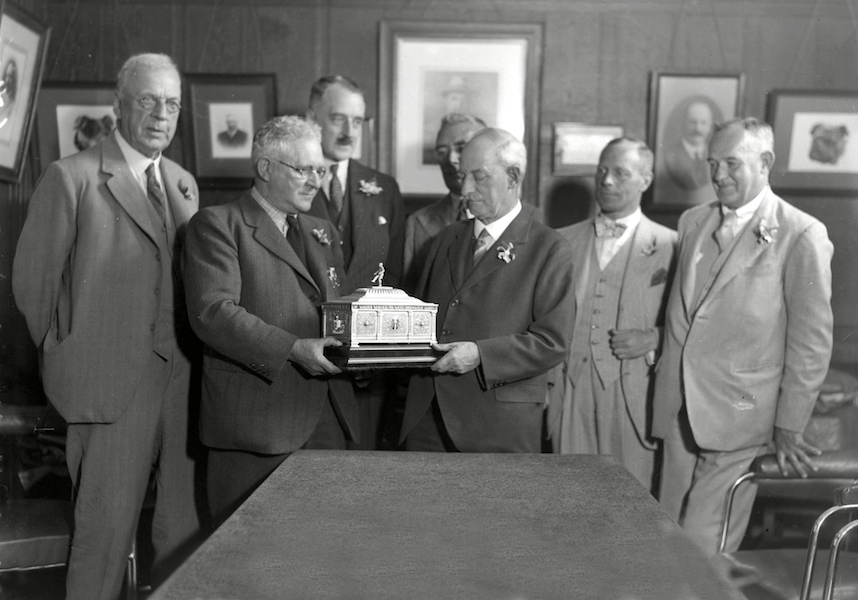
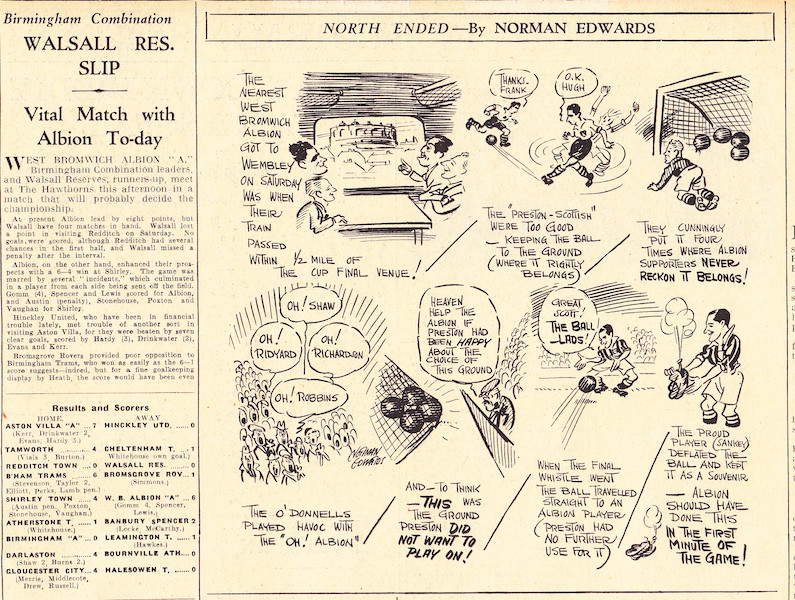
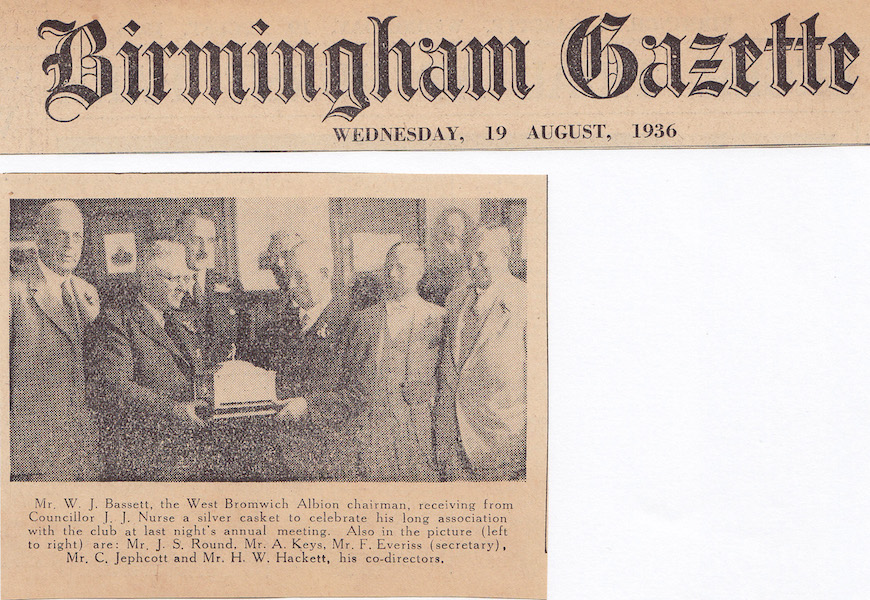
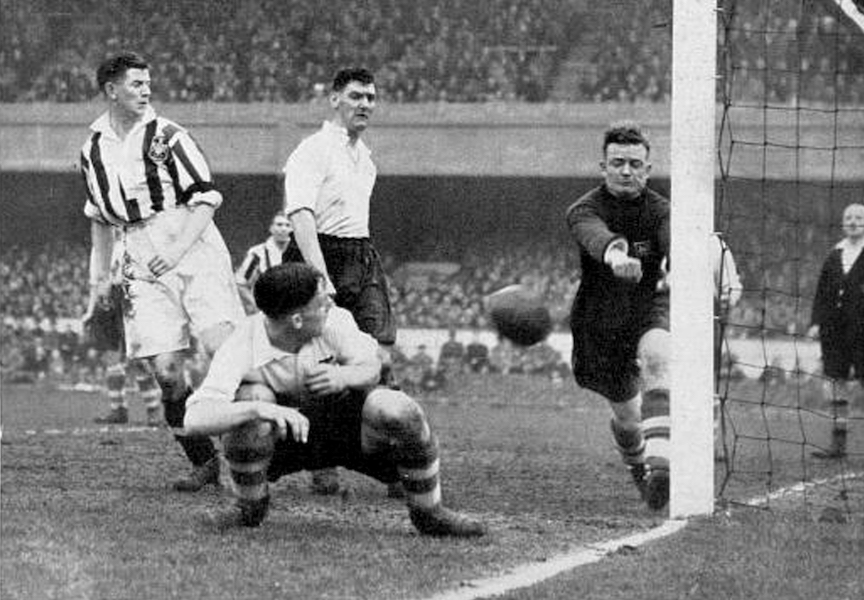
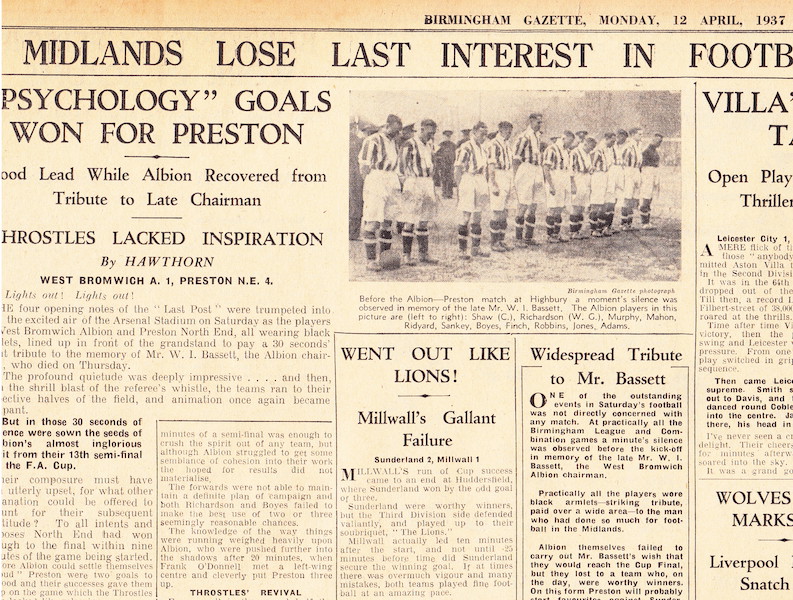
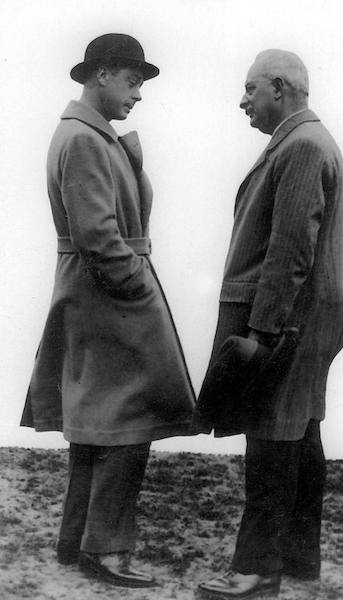
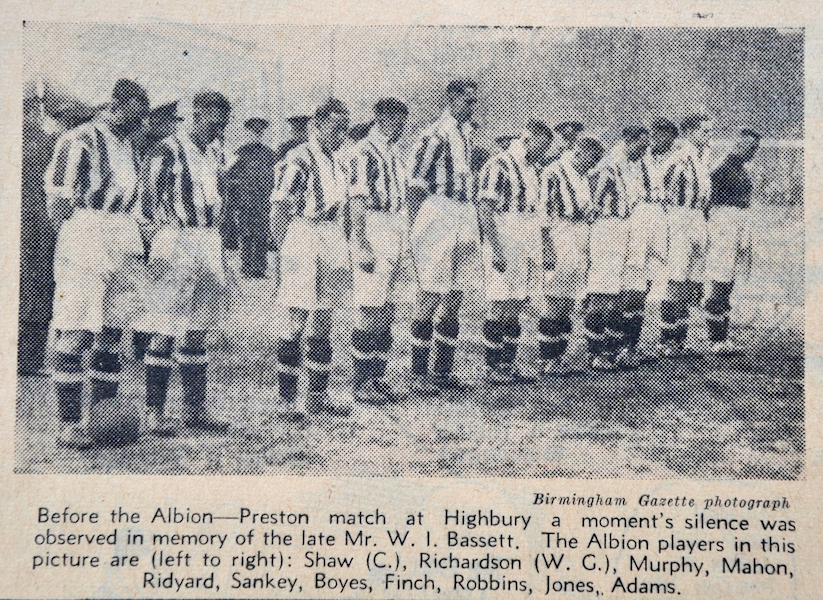
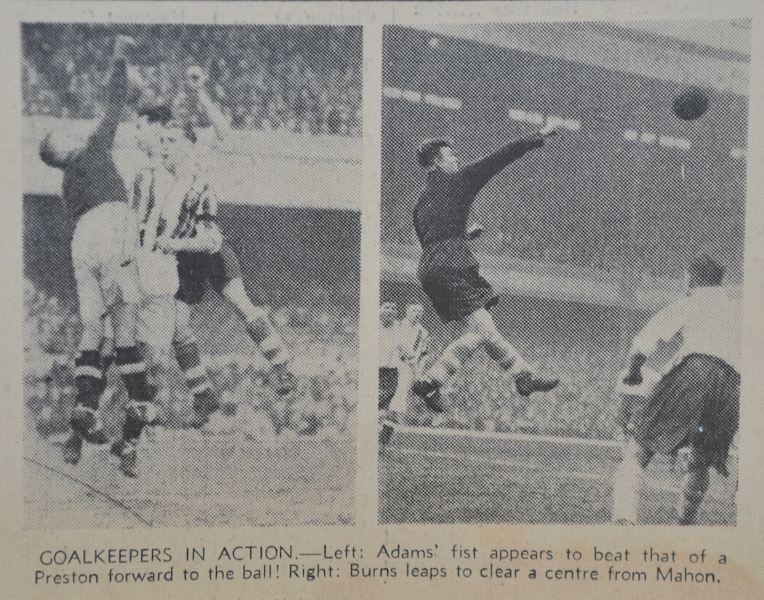
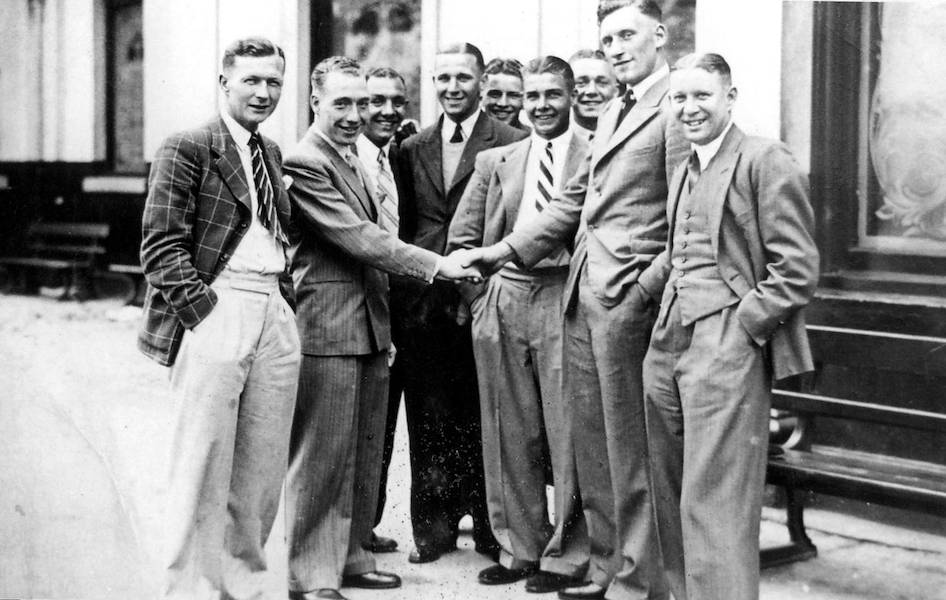
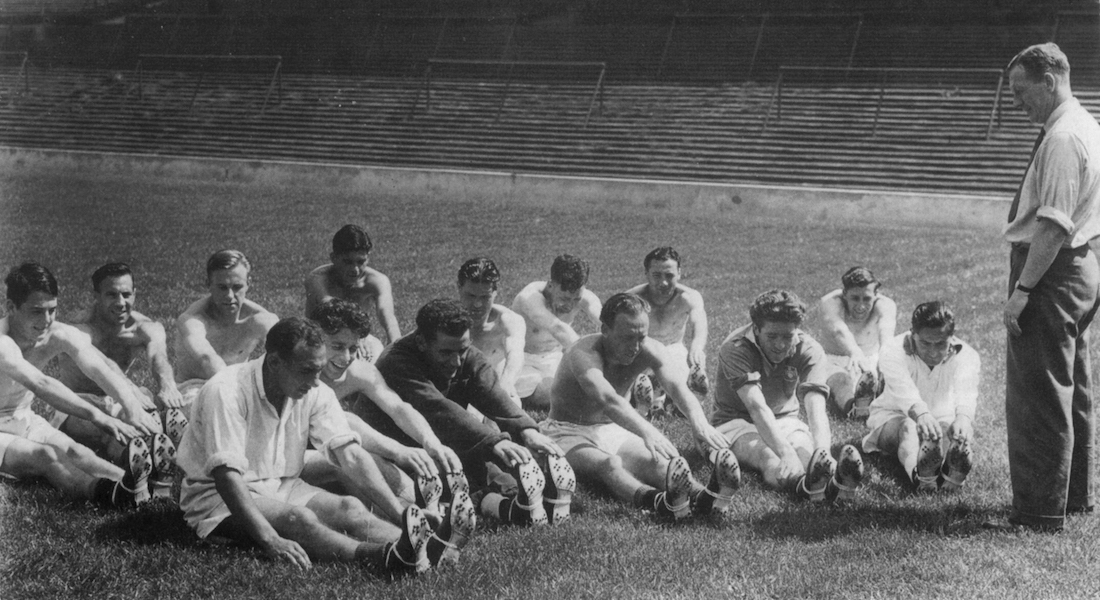
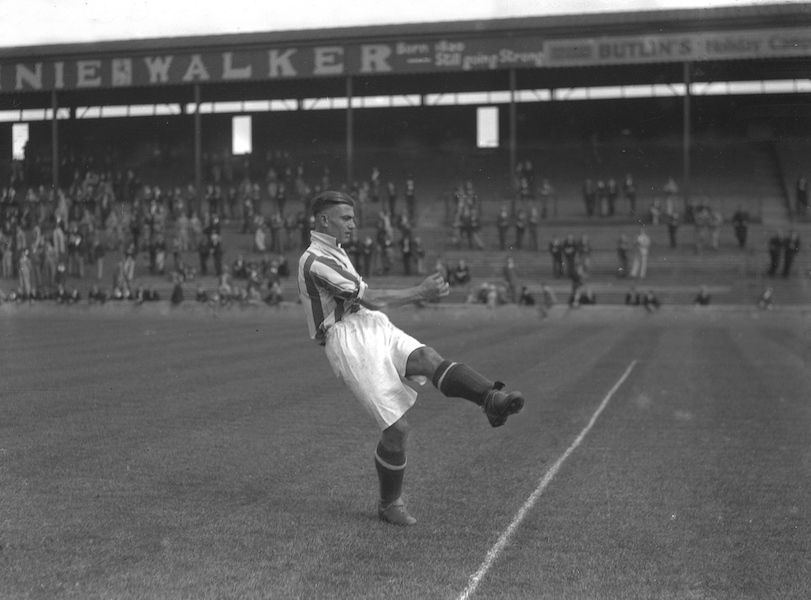
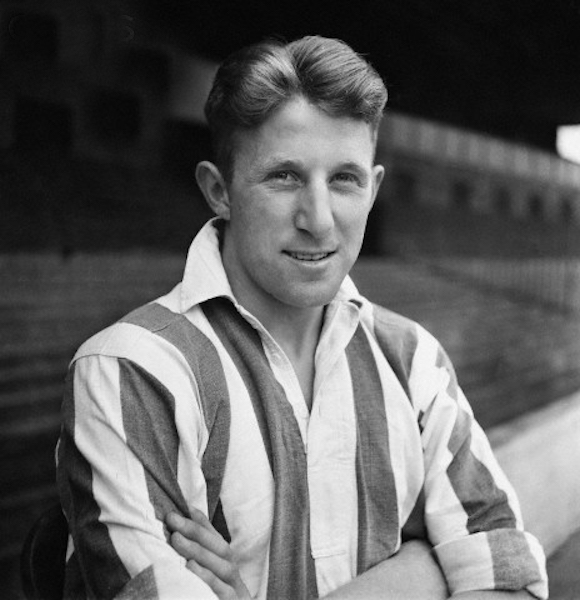
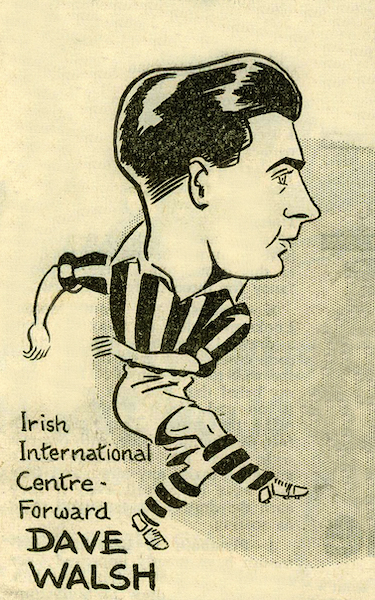
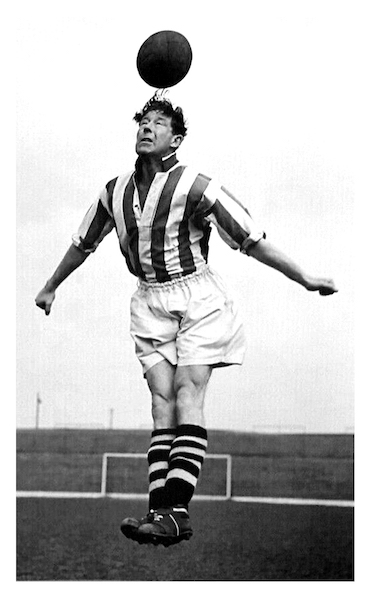
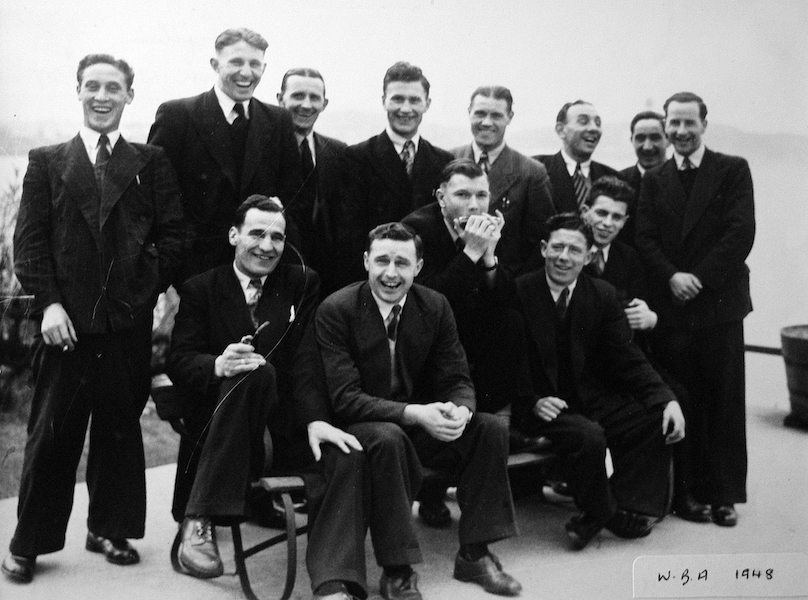
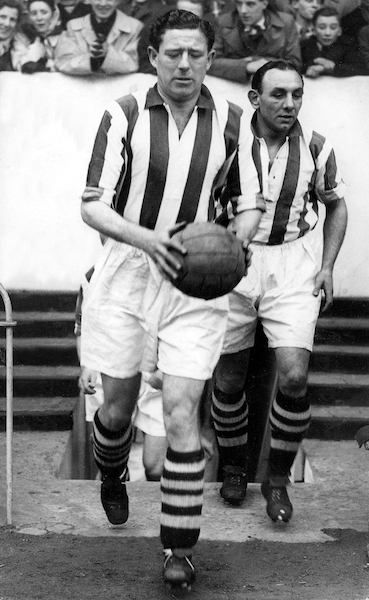
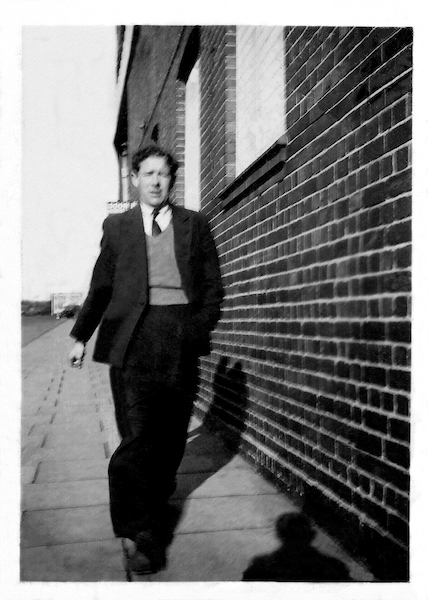
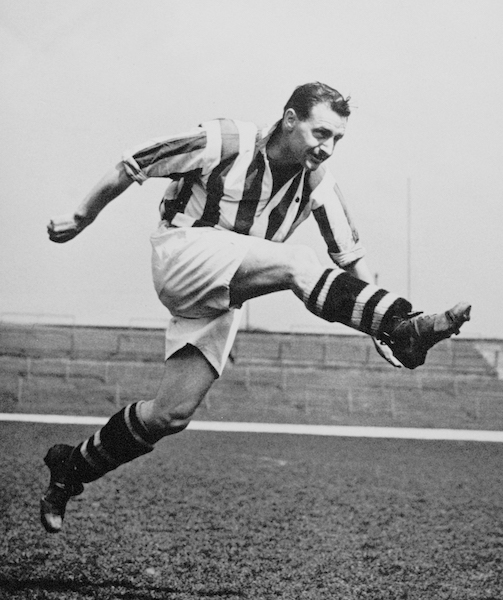
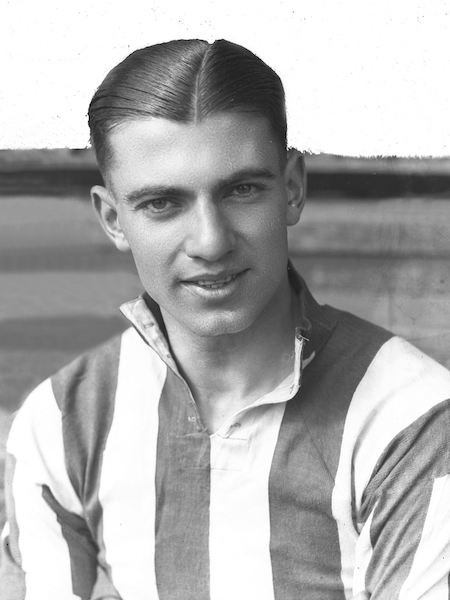
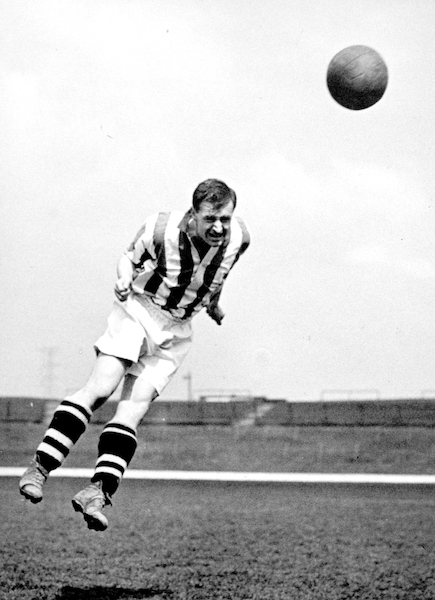
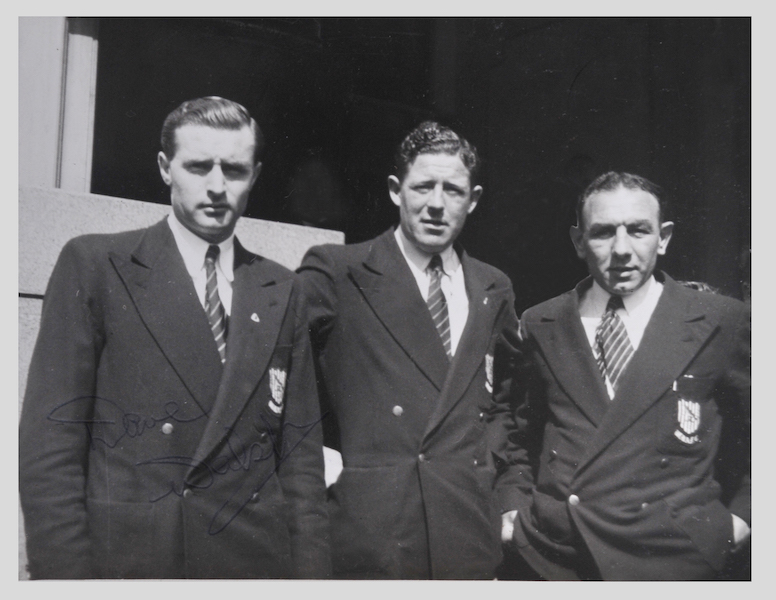
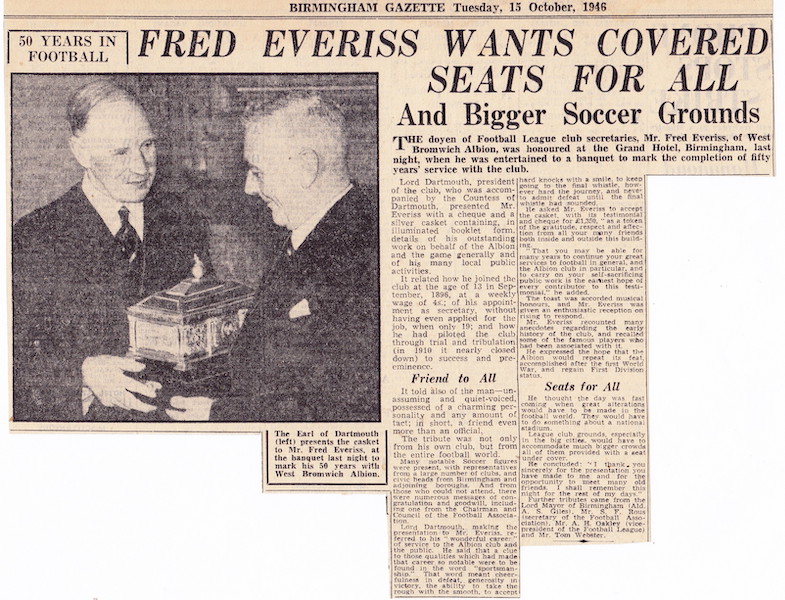
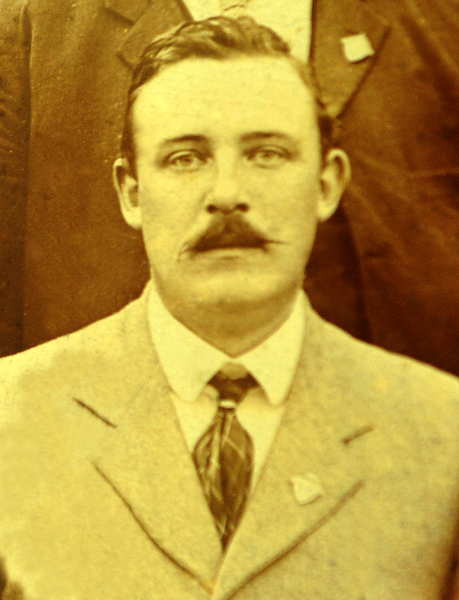
Everyone was of the opinion that Albion’s 4-1 defeat was largely attributed to the profound sense of loss and the deep grief that was felt throughout the football club and Albion’s performance was at best well below par, Walter Robbins solitary goal very little to show for the achievement of making it through to yet another classic Semi-Final, Albion’s sixteenth including replays. In addition to Mr Bassett’s passing, at the conclusion of the season, Club President Sir Ernest J Spencer also stepped down from his role after thirty three years at the helm of the club due to ill-health, the club therefore losing two hugely influential figures in a few short months, putting even more pressure on Fred Everiss, who was single handedly holding everything together.
As for ‘WG’ Richardson, with Albion relegated before the outbreak of the second World War in 1939, the conflict forcing the cessation of the Football League programme for the duration, Richardson would now ‘enjoy’ what was quite literally a new ‘career’ in war-time football, and of course Ginger being Ginger, would create even more club records, in terms of appearances and goals scored, albeit in war-time. He mixed his war-time career, with an equally important role as a Special Constable in the West Bromwich Police, which ironically gave him access to even more football, playing representative games for the National Police side, the Metropolitan Police and the Civil Defence which he embraced with the same passion as he had embraced his career at The Hawthorns before war broke out. At the end of the hostilities he would play non-league football for Shrewsbury Town, before officially ‘Hanging his boots up’ and returning to The Hawthorns take up a position as first team coach in 1946, under the continued management of his great friend Fred Everiss, in time for the resumption of the Football League proper in 1946, when the club’s efforts would once again be totally focused on promotion back to the First Division at the earliest opportunity.
With promotion the major focus of Fred Everiss, following a short May tour of three games in Belgium and Luxemburg the Albion ‘boss’ set sail across the Irish sea in the summer of 1946, and signed two quite magnificent and influential players from the Emerald Isle, both internationals in their own right, Dave Walsh, a goal scoring centre forward from Linfield and fellow Irishman centre half Jack Vernon, for a record fee of £9,500 from Belfast Celtic, who Everiss immediately made club captain, taking advantage of his magnificent leadership attributes. Vernon signed a ‘unique’ five year deal in February 1947, with the understanding that he would leave the club, to return to his homeland at the end of the five year period in 1952. The two Irishmen would become the nucleus of Everiss’s visionary promotion dreams that would be fulfilled three years later in 1949. Vernon however would not make his first team debut for Albion until the March 1947, at Upton Park against West Ham United, due to the hardest English winter for many years that curtailed so much football in the second half of that 1946/47 season. After beating Southampton 1-0 at The Dell in February 8th 1947, Albion would not play another game until that 3-2 defeat at West Ham on March 15th.
To say that Walsh, came out of the starting blocks at full speed, on the resumption of League Football was perhaps an understatement, Walsh making his debut in a 3-2 victory at Swansea Town on August 31st 1946, and creating a club record by scoring in the next five games of the season, a total of eight goals in six games, adding goals against Coventry City, Tottenham Hotspur, Birmingham City, Burnley and Barnsley, and would top Albion’s goal scoring list that season with 29 goals, 28 in the league and one in the F.A cup against Leeds United.
It was a season that was completely ruined by the severe English winter with so many games postponed in the February and March, Albion finishing seventh in Division Two, fourteen points adrift of ‘Champions’ Manchester City, but every season has of course a silver lining, and in the case of that first season after the war, it was the league debut of a lanky young man from Swindon, by the name of Raymond Barlow, who would of course become the ‘great’ Ray Barlow to so many in the years to come.
Barlow would make his Football League debut for Albion against Newport County at Somerton Park, on 28th September 1946, scoring on debut in Albion’s 7-2 victory, however, he actually made his club debut in the war years against Walsall in 1945, after signing as an amateur in 1944, and scored six goals against the Smethwick League side in a 1945 friendly match, Albion winning 17-0 no less! He would leave Albion in 1960, very much against his will to be fair, to join Midland rivals Birmingham City after making a wonderful 482 first team appearances, which of course included a Wembley appearance in May 1954, when Albion won the F.A Cup. Ray also scored 48 goals for the club in his sixteen year Hawthorns career, with his very last appearance in an Albion shirt, being in a Central League reserve game against Blackburn Rovers in April of that year. The fact he only won ONE England cap during his career is one of football’s great mysteries, because Ray Barlow was quite simply a better player than any of those holding down places in the England squad of the time.
As well as being a fabulously talented wing half, Barlow proved his ability, at inside forward, centre forward and centre half. He was a legend in every sense of the word, as was the great Fred Everiss, the man that had pulled the club through crisis after crisis, and stood proud and tall in October 1946, when the President of the football Club, the Earl of Dartmouth, presented Fred with a silver casket to recognise the great man’s fifty years of unstinting and loyal service to club, that arguably would have disappeared out of sight with his, Billy Bassett’s and Harry keys interventions and financial support.
With the 1946/47 season now confined to the history books, Albion set off the following 1947/48 season in tremendous fashion, undefeated in the first seven games, having beaten Tottenham, Fulham twice, Barnsley and Coventry, plus two draws against Plymouth and Luton Town, Dave Walsh scoring six of Albion’s ten goals, with George Drury an inside forward signed from Arsenal, scoring the other four. Walsh in fact scored all four of Albion’s goals in the first three games, and would top the goal scoring list for the second season in succession at the end of the campaign with twenty two goals, with the Throstles sadly falling short once again, with another seventh place finish in the table. It was a season that saw another youngster arrive at The Hawthorns, who would become a complete legend, and Cup winning captain. Signed as an amateur centre forward just before the war, Len Millard, reverted to left back taking over from Harry Kinsell, and would make a staggering 627 first team appearances for the club in an equally staggering twenty one year Hawthorns career, scoring 18 goals, after signing those amateur forms way back in 1937. Len would of course lead his Albion team mates out of that Wembley tunnel on Cup Final day in 1954, and of course far more importantly, take the cup back home with him to West Bromwich.
Other debutants during that season were Jack Haines, Denis Gordon, Norman Heath and Peter McKennan the latter had ‘guested’ for Albion during the hostilities and impressed Fred Everiss. The season would also mark the first goal of an extraordinary career for Arthur Rowley, who would net an incredible 434 career goals for his various clubs, Rowley switching to 1949 ‘champions elect’ Fulham in an exchange deal with Ernie Shepherd the following season, after scoring just five goals for the ‘Throstles’.
At the end of the 1947/48 campaign, Secretary manager Fred Everiss, historically handed over the reins of the club to a new man, Albion’s first ever ‘official’ club manager, former Chelsea and Wolverhampton Wanderers player Jack Smith, who had actually been a trialist at The Hawthorns as a sixteen year old. Everiss who had taken over managerial duties along with his secretarial duties back in 1902, stepping up after Frank Heaven* resigned, and had actually been associated with the club for fifty two years since becoming an office boy in 1896, would relinquish his managerial role, which he considered far too demanding for just one man, and became a Director still overseeing important issues and without doubt a confidante and mentor of Smith. It was a position Everiss held until his death in 1952.
*Heaven was in fact was a pivotal character in the formulation of the move to The Hawthorns in 1900, and remained as Secretary/manager until 1902, when Albion gained promotion back to the First Division under the captaincy of Dan Nurse, but decided to take two years out of the game, returning as Secretary of Third Lanark in Scotland. He sadly passed away aged just 32 years of age in 1905.
